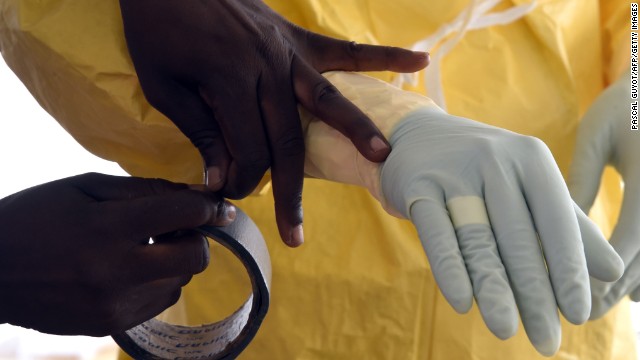Hubris Prevents Americans from Understanding Meaning of "Ebola Protocol Breach"
The tragedy of Eric Thomas Duncan's death has now been compounded by the fact that a nurse caring for him has come down with Ebola. But rather than attack the Centers for Disease Control (CDC) for bringing us the news, let's try to understand what "protocol breach" means in this context.
The CDC was not blaming the nurse for this accident, but listen up, folks. We all know that surgeons and nurses in the operating room have to follow careful protocols of hand washing and so forth. The purpose is so as not to contaminate the open wound of the surgical patient with bacteria and not to contaminate themselves with the patient's infection. However, if a protocol has been breached in some itty bitty way, like the nurse rubs an itch on the side of her nose with a gloved hand, or perhaps at the end of the operation the surgeon removes a glove before his face mask, or whatever the protocol is, no one is the wiser. Chances are slim that there will be medical repercussions. That is, in the course of doing medicine in America protocol breaches have never been lethal at an almost immediate, microbial level. As a consequence, in the practice of medicine, doctors and other healthcare workers go through the protocols, but have no experience in handling them as though their lives depended on every step in some rigid, almost fanatical way. This is why in Ebola clinics in West Africa, while the conditions may be primitive by our standards, the protocols are followed so rigorously that two people are required in the changing rooms when a person removes the protective gear and so forth. The tiniest, most seemingly inconsequential mistake is lethal with this disease. American health care workers do need to be retrained to handle Ebola because they must now learn techniques or protocols that have been developed in the Ebola-zones of Africa through trial and error.
In fact, the big difference between Texas Health Presbyterian Hospital and the three U.S. hospitals that treated Ebola patients without mishaps is the fact that the latter had bio decontamination units, that the Texas hospital did not have. After all, no one was really expecting a man with Ebola to walk into the waiting room of that Texas hospital. An article in Vox, entitled: 3 US hospitals stopped Ebola from spreading. Why didn't Texas? explains the complexity of a situation that was not the Texas hospital's fault:
There's something unique about the three hospitals that have so far successfully treated Ebola patients — something that's different from Texas Presbyterian Hospital in Dallas, where a patient died and one worker treating him became infected.
Emory, the University of Nebraska, and the National Institutes of Health have all received and successfully discharged Ebola patients. These three hospitals are among just four in the nation with specialized biocontamination units. These are units that have existed for years, with the sole purpose of handling patients with deadly, infectious dieases like SARS or Ebola.
While biocontamination units look similar to a standard hospital room, they usually have specialized air circulation systems to remove disease particles from the facility. And, perhaps more importantly, they're staffed by doctors who have spent years training, preparing and thinking about how to stop dangerous infections from spreading.Rather than denounce the CDC, Americans should stand back and recognize that we don't always get everything right the first time. Sometimes help is a two-way street. Sometimes we might even need to learn from the experiences of people in the place that we think is most in need of help itself.
RELATED POSTS:
- An Ebola Patient and a Lesson in Racial Profiling that I Hope Texans Never Forget
- Ebola Fear-Mongering Comes from Creationists Fearful That Virus Will...Ahem..."Evolve"
- Ebola Mis-steps or Is Texas Presbyterian Hospital's ER Run by Computerized Robots?
- The Real Reason the Man Infected with Ebola not Admitted to Dallas Hospital
- Re-Thinking Ebola Now that It's in Dallas (My Backyard)

Comments